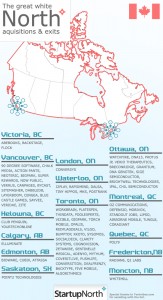Editors Note: This is a guest post by Chris Arsenault (LinkedIn, @chrisarsenault) a tech entrepreneur turned venture capitalist. Chris is the Co-Chair of the Canadian Innovation Exchange (CIX), a board member at the Canadian Venture Capital Association (CVCA), a Supporter of the C100, among other things. Follow Chris at chrisarsenault.wordpress.com or on Twitter @chrisarsenault.

 Some rights reserved by antmoose
Some rights reserved by antmoose
The last few weeks have certainly proven to be extremely promising for Canadian Tech Entrepreneurs. Almost $80M of equity financing has recently been secured from some of the top investors in the world to help build our next generation of massive tech companies. It’s even more exciting when you realize that these funds are going to three especially young, dynamic and opportunistic companies, all of which are in our backyard!
 Yona Shtern, Robert Gold and the team over at Montreal-based Beyond the Rack (“BTR”) lead the way with a whooping $37M financing round that should propel the company to new heights yet unseen on the Canadian eCommerce front. BTR has quickly established itself as an eCommerce leader by showing the market that Canadian companies really do know what a “hockey stick” revenue growth chart looks like. The teams’ ability to build such a big company in such a short time frame has earned them our utmost respect. We initially met the team and reviewed their business plan in late 2008; by 2011, they were already ranked as one of the fastest-growing online retailers in the entire world. Yona was also wise in choosing his investors, be it industry specific angels or great VCs such as Panorama Capital, iNovia Capital, Rho Canada, Tandem Expansion, BDC Venture Capital, Highland Capital Partners, EDC and Montreal Start Up. If you aren’t a Beyond the Rack member, don’t wait – register now, and you’ll be impressed!
Yona Shtern, Robert Gold and the team over at Montreal-based Beyond the Rack (“BTR”) lead the way with a whooping $37M financing round that should propel the company to new heights yet unseen on the Canadian eCommerce front. BTR has quickly established itself as an eCommerce leader by showing the market that Canadian companies really do know what a “hockey stick” revenue growth chart looks like. The teams’ ability to build such a big company in such a short time frame has earned them our utmost respect. We initially met the team and reviewed their business plan in late 2008; by 2011, they were already ranked as one of the fastest-growing online retailers in the entire world. Yona was also wise in choosing his investors, be it industry specific angels or great VCs such as Panorama Capital, iNovia Capital, Rho Canada, Tandem Expansion, BDC Venture Capital, Highland Capital Partners, EDC and Montreal Start Up. If you aren’t a Beyond the Rack member, don’t wait – register now, and you’ll be impressed!
 Just down the road from Montreal is another world class eCommerce team. Ottawa-based Shopify recently closed a $15M second round of financing. Tobias Lutke, Cody Fauser, Daniel Weinand & Harley Finkelstein have developed an industry leading eCommerce platform that is already being used by thousands of leading online retailers around the world. The team, their vision and commitment to execution all combine to make Shopify one of Canada’s tech leaders in an extremely high growth global market. Unfortunately, we missed the boat on the opportunity to work with them, but our friends over at Bessemer Ventures, Firstmark Capital, Felicis Ventures and Georgian Partners were more than happy to come aboard. I’m expecting to see Shopify rise above the tide over the coming years and establish itself as a global leader in its space.
Just down the road from Montreal is another world class eCommerce team. Ottawa-based Shopify recently closed a $15M second round of financing. Tobias Lutke, Cody Fauser, Daniel Weinand & Harley Finkelstein have developed an industry leading eCommerce platform that is already being used by thousands of leading online retailers around the world. The team, their vision and commitment to execution all combine to make Shopify one of Canada’s tech leaders in an extremely high growth global market. Unfortunately, we missed the boat on the opportunity to work with them, but our friends over at Bessemer Ventures, Firstmark Capital, Felicis Ventures and Georgian Partners were more than happy to come aboard. I’m expecting to see Shopify rise above the tide over the coming years and establish itself as a global leader in its space.
 The most recent team to announce a substantial equity-financing round is Toronto-based Fixmo. Led by its founders Rick Segal, Shyam Sheth and Joyce Janczyn, Fixmo just announced a $23M round. This investment round included both existing investors (iNovia Capital, Panorama Capital, Rho Canada and Extreme Venture Partners) and an impressive syndicate of new lead investors: Silicon Valley-based Kleiner Perkins Caufield & Byers, Washington-based Paladin Capital Group and Hong Kong-based Horizons Ventures. While the company’s core vision has not changed over the last two years, the product development road map has evolved at a rapid pace. Within an extremely short time frame, Fixmo launched a series of Government and Enterprise products, acquired two companies (Conceivium Business Solutions and Chocolate Chunk Apps), established a series of key partnerships and practically jumped ahead of every other Mobile Risk Management solution provider in the market. Obviously, the founders didn’t do it alone, but the sheer fact that Rick was successful in attracting some of the best talent out there (Bruce Gilley, Jonas Gyllensvaan, Tyler Lessard, Lee Cocking, John Yuen and others) speaks to the long term execution ability and potential of Fixmo.
The most recent team to announce a substantial equity-financing round is Toronto-based Fixmo. Led by its founders Rick Segal, Shyam Sheth and Joyce Janczyn, Fixmo just announced a $23M round. This investment round included both existing investors (iNovia Capital, Panorama Capital, Rho Canada and Extreme Venture Partners) and an impressive syndicate of new lead investors: Silicon Valley-based Kleiner Perkins Caufield & Byers, Washington-based Paladin Capital Group and Hong Kong-based Horizons Ventures. While the company’s core vision has not changed over the last two years, the product development road map has evolved at a rapid pace. Within an extremely short time frame, Fixmo launched a series of Government and Enterprise products, acquired two companies (Conceivium Business Solutions and Chocolate Chunk Apps), established a series of key partnerships and practically jumped ahead of every other Mobile Risk Management solution provider in the market. Obviously, the founders didn’t do it alone, but the sheer fact that Rick was successful in attracting some of the best talent out there (Bruce Gilley, Jonas Gyllensvaan, Tyler Lessard, Lee Cocking, John Yuen and others) speaks to the long term execution ability and potential of Fixmo.
Ambition coupled with Execution
The average tech financing round in Canada is under $4M. Therefore, the aforementioned three companies basically raised as much cash as 20 average Canadian tech startups combined. Obviously, I get nervous when I see a company (portfolio or not) raise such a large chunk of cash. Why? It’s not because I like the small size of the average Canadian financing rounds. Rather, it’s because I think that too much money for a young business can be as bad as or worse than not having enough. $15M-$40M rounds for Canadian tech companies are amongst the largest we have seen this side of the border in over 10 years. That being said, I do also think that Canadian Tech Entrepreneurs are now entering a phase of Ambition coupled with Execution. We have lived through too many years of “lack of ambition”, quickly followed by “lack of execution”, not to mention the much lamented “lack of capital”. However, we are now seeing deals done where massive amounts of ambition and execution converge, and capital is becoming available to build large tech companies right here in our own backyard. With more companies able to raise the amount of funding they truly need to generate hundreds of millions of dollars of revenue, not only we will stop selling our companies short, they won’t need to move down south. Hopefully other investors will note the phenomenon, and future startups won’t have as much trouble raising the capital both from Canada and into Canada. And that’s good for all of us.
At iNovia, when a massive opportunity knocks, we answer! I’m expecting to be sharing a lot more stories about successful Canadian entrepreneurs, and how they’ve built hugely successful companies here as they compete globally for resources, capital and market share. There isn’t much stopping the entrepreneurs driving Canada’s next generation of large tech companies, and for the likes of Beyond the Rack, Shopify, Fixmo and many others, this is just the beginning.
Congratulations to all the teams mentioned in taking important steps on their paths to success!
Below some article worth reading with regards the above companies:
Editors Note: This is a guest post by Chris Arsenault (LinkedIn, @chrisarsenault) a tech entrepreneur turned venture capitalist. Chris is the Co-Chair of the Canadian Innovation Exchange (CIX), a board member at the Canadian Venture Capital Association (CVCA), a Supporter of the C100, among other things. Follow Chris at chrisarsenault.wordpress.com or on Twitter @chrisarsenault.

![]() Some rights reserved by waferboard
Some rights reserved by waferboard











